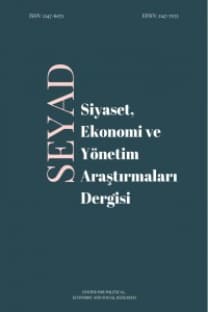Alternatif faizsiz sigortacılık uygulamaları ve gelir seviyesine göre kamu bilincinin değerlendirilmesi: Ampirik analiz
Faizsiz sigortacılık, tekafül, kamu bilinci, Türkiye
Alternative Interest-Free Insurance and Investigating Public Awareness by Income Level: Empirical Analysis
Interest-free insurance, takaful, public awareness, Turkey,
___
- AlNemer, H. A. (2013), “Revisiting Tekafül Insurance: A Survay On Functions And Dominant Models”, Afro Eurosian Studies, 231-253.
- Ang, A., & Kumar, S. (2014), “Financial Development And Barriers To The Cross-Border Diffusion Of Financial Innovation”, Journal of Banking & Finance, 43-56.
- Bagdonavicius, V., & Nikulin, M. (2011), “Chi-Square Goodness-Of-Fit Test For Right Censored Data”, The International Journal of Applied Mathematics and Statistics.
- Bhatty, A. (2008), Will tekafül penetration match conventional insurance? Second International Tekafül Summit. London.
- Chapmen, R., Soosay, C., & Kandampully, J. (2003), “Innovation In Lojistic Services And The New Business Model”, International Journal of Physical Distribution and Logistics, 630-650.
- DİB. (2005, 7 4), Sigorta. Retrieved from Türkiye Cumhuriyeti Diyanet İşleri Başkanlığı Din İşleri Yüksek Kurulu
- http://www2.diyanet.gov.tr/dinisleriyuksekkurulu/Sayfalar/Sigorta.aspx
- El-Gamal, M. A. (2006), Islamic Finance, Law, Economics and Practice, New York: Cambridge University Press.
- Engku, A. (2008), Essential Guide for Tekafül (Islamic Insurance), Kuala Lumpur: CERT Publication Sdh, Bhd.
- Greenwood, P., & Nikulin, M. (1996), A Guide to Chi-squared Testing, New York: Wiley.
- Innovative Emergency Management. (2000), Measuring Public Awareness: A Quick Reference Guide, London: IMC.
- Karaman, H. (1997), “Laik Düzende Dini Yaşamak”, İslam Medeniyet Dergisi, p. 110.
- Lewis, M. K. (2003), Challenges to the tekafül industry, New Horizon.
- Madura, J. (2001), Financial Markets and Institutions. Cincinnati, OHIO: South-Western College Publishing.
- Moore, G. (2002), Crossing the Chasm and Beyond, Strategic Management of Technology and Innovation, 429.
- Morita, A., Reingold, E. M., & Shimomura, M. (1991), Made in Japan: Akio Morita and Sony. New York: E. P. Dutton.
- Miller, R., & Jentz, G. (2000), Business Law Today. Cincinnati, OHIO: West Legal Studies in Business.
- Sağlam, H. (2009), The Evelation Of Opinions On Relation Amang Insurance And Interest In Accordance To Islamic Law. Hukuk, Ekonomi ve Siyasal Bilimler.
- Thakur, R., & Hale, D. (2013), “Service innovation: A Comparative Study Of U.S. And Indian Service Firms. Journal Of Business Research”, 1108-1123.
- Ustaoglu, M., Incekara, A. & Yildiz, B. (2013), “Analysis Of Economic Growth And Financial Structure Of Participation Banks, Islamic Views And Agenda: Case Of Turkey”, Journal of Islamic Banking and Finance.pp.1-10
- Zarabozo, J. a.-D. (2003 ), The Question of Insurance Outside of the “Lands of Islam”. AMJA Conference, (pp. 1-30), Copenhagen, Denmark.
- ISSN: 2147-6071
- Yayın Aralığı: Yılda 2 Sayı
- Başlangıç: 2014
- Yayıncı: Politik Ekonomik ve Sosyal Araştırmalar Merkezi
Sosyal Dışlanma ve Avrupa Birliği Yaklaşımı
İndirgenmiş Nakit Akış ve Göreceli Değerleme Yöntemlerinin Karşılaştırılması
Yahia BOUCHETA, Lakhdar ADOUKA, El Mustapha KCHIRID
Sosyal Devlet Anlayışı Çerçevesinde Türkiye’de Sosyal Koruma Harcamalarının Gelişimi ve Yoksulluk
Türkiye’de Eğitim Harcamaları ve Ekonomik Büyüme Arasındaki İlişki: ARDL Sınır Testi Yaklaşımı
Kitap Tanıtımı: Dan Ariely, Akıldışı Ama Öngörülebilir
